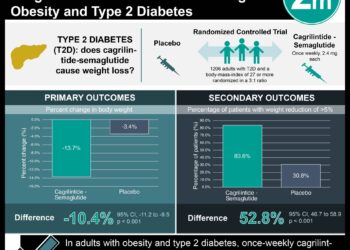Modifiable lifestyle factors may halve risk of gestational diabetes
1. Women who had a low body weight, ate a healthy diet, exercised regularly, and were non-smokers prior to pregnancy had approximately half the risk of developing gestational diabetes.
2. Increased BMI posed the greatest risk of developing gestational diabetes, with approximately one in four cases found to be attributable to being overweight or obese.
Evidence Rating Level: 1 (Excellent)
Study Rundown: Gestational diabetes mellitus (GDM) is an increasingly common complication of pregnancy and is estimated to affect up to 25% of pregnancies in the United States depending on criteria and sample population. GDM leads to increased pregnancy complications, such as pre-eclampsia and birth defects, as well an increased risk of maternal Type 2 Diabetes post-pregnancy. Several studies have linked modifiable lifestyle factors to increased risk of GDM, but no studies to date have quantified the joint effect of several lifestyle factors within a large prospective cohort. The authors examined data from over 10,000 adult U.S. women and found that BMI, smoking status, diet, and physical activity were all significantly associated with risk of developing GDM. Among the lifestyle factors, a higher pre-pregnancy BMI was the strongest individual risk factor for developing GDM. When the risk factors were examined jointly, women who reported a low body weight, healthy diet, regular exercise, and non-smoking status had 52% lower risk of developing GDM compared to all women, and an 83% lower risk compared to women with none of the healthy lifestyle factors.
This study was well designed as it used a large validated prospective cohort and controlled for other GDM risk factors including maternal age, number of pregnancies, and family history of diabetes. The fact that lifestyle factors and the diagnosis of GDM were self-reported is a study limitation. However, weight, physical activity, and GDM self-report within this cohort were validated in previous studies. Overall, the study contributes to the literature by quantifying the synergistic relationship between four joint lifestyle factors and risk of GDM, which supports lifestyle modifications as a possible effective public health intervention to prevent GDM.
Click to read the study, published today in the BMJ
Click to read an accompanying editorial in the BMJ
Relevant Reading: Effect of intensive counseling on physical activity in pregnant women at high risk for gestational diabetes mellitus
In-Depth [prospective cohort]: This study aimed to quantify the effect of four modifiable lifestyle factors (weight, diet, physical activity, and smoking) on the risk of developing GDM. Authors used a sample cohort from the Nurses’ Health Study II to analyze data on 14,437 healthy women and their 20,136 singleton live births in the United States during 10 years of follow-up. The cohort self-reported the study factors in various questionnaires collected between twice a year and every four years, depending on the variable. GDM self-reports were assumed to be accurate based a previous validation study that confirmed 94% of cases through medical records. Multivariable log binomial models were used to estimate association and sensitivity analyses was conducted to test the robustness of the model. Authors found that BMI had the strongest association with GDM of the four lifestyle factors with an attributable risk percentage for pre-pregnancy overweight/obesity of 28% (CI95% 25-31%). Low risk in all four lifestyle factors (non-smoker, ≥150 minutes weekly of physical activity, healthy diet, and BMI < 25) was associated with a 52% reduction in risk of GDM compared with all women (relative risk 0.48, CI95% 0.38-0.61%) and 83% lower risk compared to women who had none of the low risk lifestyle factors (RR 0.17, CI95% 0.12-0.25%). Finally, authors found that 47.5% (CI95% 36.6-56.6%) of GDM cases could be attributed to the combination of all four poor lifestyle factors (overweight, poor diet, inactive, smoker).
More from this author: Unhealthy food cues prominent in children’s programming in the UK and Ireland, Blood cell folate concentration may accurately predict neural tube defects, BCG vaccine protective against active tuberculosis in children, Benzodiazepine use linked with Alzheimer’s disease, U.S. firearm fatality rates differ by state, race, and ethnicity
Image: PD
©2012-2014 2minutemedicine.com. All rights reserved. No works may be reproduced without expressed written consent from 2minutemedicine.com. Disclaimer: We present factual information directly from peer reviewed medical journals. No post should be construed as medical advice and is not intended as such by the authors, editors, staff or by 2minutemedicine.com. PLEASE SEE A HEALTHCARE PROVIDER IN YOUR AREA IF YOU SEEK MEDICAL ADVICE OF ANY SORT.






